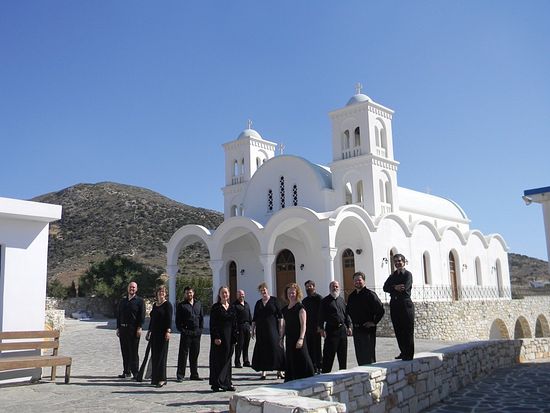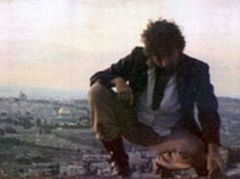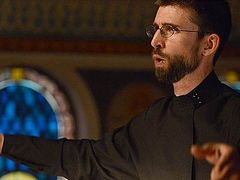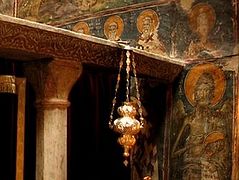Source: Oregon Live
September 20, 2016
 The Portland choir Cappella Romana on its first tour to Greece, on the island of Paros, in September 2011. (Cappella Romana)
The Portland choir Cappella Romana on its first tour to Greece, on the island of Paros, in September 2011. (Cappella Romana)
When Alexander Lingas moved to San Francisco in 1990, the Greek Orthodox cathedral where he'd just been appointed associate cantor lay in ruins, devastated by the 1989 Loma Prieta earthquake. Lingas wanted to help the church rebuild – and the only contribution he could offer was music.
The Portland native had sung in his Greek Orthodox church, with local choir Cantores in Ecclesia and with the Portland State Chamber Choir. So he and his Portland musical friends piled into a van and headed south to perform a benefit concert. The church offered them lodging and a lavish, post-concert spaghetti dinner with freshly cured Greek olives.
After hearing the Northwesterners sing Greek Orthodox music from ancient Byzantium as well as contemporary Greek-American composers and more, nearly 300 listeners donated money for cathedral reconstruction. Lingas and friends decided to keep making music. To evoke the Byzantine empire's Roman heritage and the medieval Greek concept of a religious world that embraced the far-flung lands of the Roman Empire, he named the group Cappella Romana — "Roman chapel."
Since then, the Portland-based vocal ensemble, which performs annual concert series in its hometown and Seattle, has released more than 20 recordings. Its tours have brought the group's sometimes ethereal, sometimes austere, always powerfully moving music to venues such as New York's Metropolitan Museum of Art, Los Angeles' Getty Center, the Smithsonian Institution, Stanford and Yale universities and festivals throughout Europe.
But Cappella Romana has always been about more than just its core Greek niche. That first concert, which the group will reprise in its 25th anniversary concert Sept. 24, also established its eagerness to look beyond its core Byzantine chant repertoire. The concert will include music by Russian composers Igor Stravinsky and Sergei Rachmaninoff, late 20th-century British Orthodox composer John Tavener, and Greek-American composers Tikey Zes, Frank Desby and Lingas himself.
Cappella Romana earned international recognition for reviving and recording the long-lost early 20th-century Russian Orthodox Passion by Russian composer Maximilian Steinberg. It also often sings Baroque music, such as Handel's "Messiah," with Portland Baroque Orchestra. Its lineup changes depending on the music it sings.
"Lingas' spark of the idea to build a group around the very idea of the Greek, Byzantine, and other flavors of choral music, including contemporary composers, has gifted Portland, and the nation with a rare consciousness of some things many of us never knew: What was sung, and as important, how it was sung, in the rarefied atmosphere of medieval and pre-medieval cultures," says Bruce Browne, a Portland champion of choral music who directed the Portland State choral program when Lingas studied there.
Cappella Romana has also made significant contributions to musical scholarship via Lingas' work in unearthing ancient manuscripts and making them performable by modern musicians.
But Lingas insists that Cappella's music is relevant to a broad range of listeners, not just scholars.
"Ancient traditions of music have a contemporary resonance somehow," he explains. "It's this fantastically intricate and sophisticated world. People know this from the visual art of the time they might see in a museum, but there is a sound world associated with it that we bring to a wider audience."
He also points to the group's performances and recordings of contemporary music by composers such as Oregon's Robert Kyr; Britain's Ivan Moody; Finnish composer Einojuhani Rautavaara, whose music the group performs in January; the great Estonian composer Arvo Pärt, whom the group will celebrate in a February festival, and more. "Composers like Pärt and Tavener and others are recognized by modern audiences as having ties to ancient traditions, but people have found in their music a kind of a window into a wider spiritual world," Lingas says.
Lingas is gratified to see Cappella professionalizing, having recently brought aboard two full-time employees, including singer and executive director Mark Powell, who had previously split time with Portland Baroque Orchestra. He'd like to increase collaborations with other organizations throughout the world. And he looks forward to continuing the group's musical explorations. At a recent appearance at a Dutch festival of early European art music, for instance, the group sang music from Greek colonies in 16th-century Venice and St. Petersburg that had sat unperformed for four centuries.
"One of the joys of what we do is that the traditions we're exploring are so rich that there's an inexhaustible supply," he says. "There's lots to do. We'll continue exploring all these things we've found and sharing them with people."
--Brett Campbell, for The Oregonian/Oregonlive
***
Cappella Romana, "Orthodox Voices" 25th anniversary concert
Where: Trinity Episcopal Cathedral, 147 N.W. 19th Ave.
When: 4 p.m. Saturday, Sept. 24
Tickets: $22; student discounts and Arts For All tickets for Oregon Trail cardholders available; cappellaromana.org or 503-236-8202



